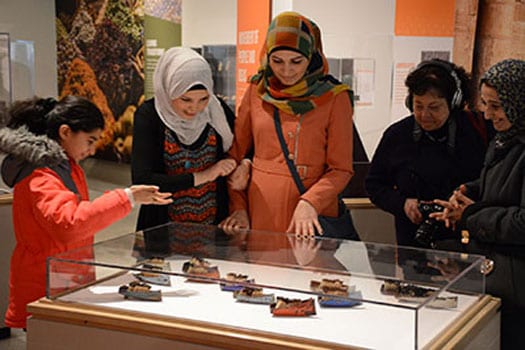
February 18, 2019; Hyperallergic
When the University of Pennsylvania Museum of Archaeology and Anthropology (Penn Museum) recently reopened its newly renovated Middle East Galleries, it did so with the help of four special ambassadors: the first members of the Global Guides: Immigrant Stories Tour Program, funded by The Barra Foundation. These recent immigrants from Syria and Iraq offer personalized tours on Saturday and Sunday afternoons (open to all and included with admission) and do their best to help visitors appreciate the more than 1,200 objects in the Middle East Galleries. When the Mexico and Central America Gallery and the Africa Galleries reopen later this year—the museum is in the midst of a major transformation—immigrants from those places will be added to the Global Guides. As explained on the museum website:
What better way to learn about the culture of another place than to speak to someone who grew up there? Through the Global Guides Program, the Museum offers gallery tours led by immigrants and refugees. In addition to sharing historical information about the artifacts on display, the guides combine personal experiences and stories to interpret objects from their countries of origin.
In recent years, NPQ has reported frequently on the need for increased attention to diversity and inclusion in US museums. This is a big topic, and includes efforts to diversify staff leadership, curatorial staff, and board leadership. It includes attention to who feels welcome in cultural institutions—based on what is being displayed as well as ticket prices and other real or perceived barriers to admission. And, as explored in the Winter 2018 issue of the Nonprofit Quarterly print journal, increasingly, this conversation includes questions about who owns the narratives being offered by museums—as well as who (rightfully) owns the artifacts (and sometimes the artwork) in a museum’s collection.
Sign up for our free newsletters
Subscribe to NPQ's newsletters to have our top stories delivered directly to your inbox.
By signing up, you agree to our privacy policy and terms of use, and to receive messages from NPQ and our partners.
The Global Guides Program steers the conversation in a new direction, engaging people with personal ties to the history on display as those who help to shape the narratives shared with and experienced by visitors. So much is packed into this concept: taking diversity and inclusion to a very visible staff level; allowing visitors to learn about the present-day lives of people who come from the ancient worlds represented in these galleries; and, of course, providing visitors an opportunity to meet and hear from new immigrants and refugees—people who happen to have a passion for history and culture and are still finding their way as new arrivals in the US.
As noted in the Hyperallergic article, the Penn Museum “asserts that its Middle Eastern objects were acquired fairly and ethically; most are the result of excavations funded by the Penn Museum in collaboration with local governments.” Some might take issue with that, and in fact Hyperallergic writer Olivia Jia expresses reservations about the provenance of the items, which taken together represent a stunning collection. However, she notes that her experience at the museum, and specifically the tour she took led by Syrian refugee Moumena Saradar (whose personal journey has taken her to several countries) and a conversation she had with Saradar after the tour, has “complicated” her feelings about the museum and its collections. She observes:
For Saradar, the Penn Museum has become a home away from home, a safe place where she has ample time and space to mull over her feelings about Syria and her cultural heritage—issues she says she didn’t consider when she lived in Syria but are powerful and potent now that she lives in the United States. Heritage tied to her land means more to her now that it is inaccessible, and so these artifacts—and the Penn Museum itself—have become cultural ambassadors within her own immigration story. Though she recognizes that many others in her local network of Syrian and Iraqi refugees feel differently, she is content with the museum’s ownership of these objects. There, she says, they are safe from destruction and war. Saradar added that programs like the Global Guides are innovative ways for museums to create real, positive change through their artifact collections.
Jia also notes that exit surveys suggest about half the visitors to the new Middle East Galleries do not personally know a single person from the Middle East. This alone might be enough to justify the Global Guides program. But combined with all the other benefits, especially the opportunity to hear first-person, contemporary narratives that relate to the objects on display, this looks to be a program that ought to be followed and, where possible, emulated.—Eileen Cunniffe













